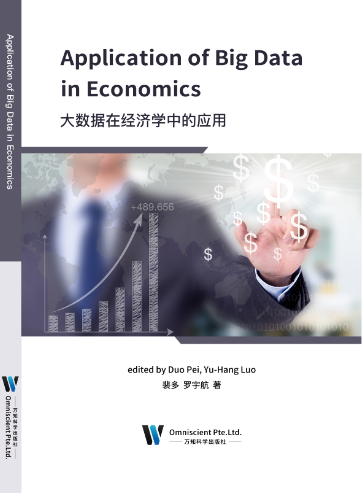
Preface
We live in the era of big data, and have been inseparable from the impact of big data. Long-term stable economic development is one of China's important development goals. There are many factors involved in economic development. The role of each factor will have a supporting or limiting effect on economic development. Therefore, if economic development is not affected by various constraints, these issues need to be analyzed in advance.However, it is not easy to analyze it in the traditional way. The subjective analysis of relevant personnel is often not objective and rational, which will affect the accuracy of the analysis.Big data can effectively solve this problem. It has a large amount of data, a certain diversity and no subjective color.It is an objective and reliable basis, which plays an obvious role in economics research.
前言
我们生活在大数据时代,生活中已经离不开大数据带来的影响。经济长远稳定发展是当前我国重要的发展目标之一,经济发展涉及到的因素比较多,每一种因素的作用都会对经济发展起到支持或限制的影响,因而要想经济发展不受到各种限制因素的影响,就需要提前将这些问题分析出来,但以传统的方式进行分析并不容易,相关人员的主观性分析,往往带有较强的主观性,因此会使得分析的准确度下降,大数据恰好可以有效解决这一问题,其数据量较大,并且有一定的多样性,并且其没有任何的主观色彩。其是一种客观、可靠的依据,在经济学研究中作用明显。

Duo Pei, male, the Han nationality, born in October 1980.He holds a double bachelor degree from the University of Electronic Science and Technology of China. He graduated from Chongqing University with a major in IBM and is a senior engineer.The main research direction is government informationization and big data.As the technical director, he participated in the construction of Chongqing key informatization projects, such as Chongqing node, Chongqing credit platform, Chongqing fixed assets investment platform, Chongqing e-government extranet, as well as the consultation and evaluation of national and Chongqing major informatization projects, such as Public Security Communication Network and Computer Information System Construction Project, Labor and Social Security E-Government Project, China's Golden Auditing Project, Macroeconomics System, “Pinglian”, Party Construction, etc.In addition, he has published five papers in China Information Industry, Computer Engineering and Design and Computer Simulation.
裴多,男,汉族,1980年10月出生,电子科技大学双学士,重庆大学IBM毕业,高级工程师,主要研究方向为政务信息化和大数据。作为技术负责人全程参与国家电子政务外网重庆节点、重庆市信用平台、重庆市固定资产投资平台、重庆市电子政务外网等重庆信息化重点工程的建设,以及金盾、金保、金审、金宏、平联、党建等国家及重庆市重大信息化工程咨询评估。在《中国信息界》、《计算机工程与设计》、《计算机仿真》等杂志发表论文五篇。

Yu-Hang Luo, male, the Han nationality, born in August 1974.He graduated from Chongqing Normal University with a master's degree in economics and is an associate researcher.The main research direction is the public management policy of the electronic information industry and technological innovation.He was responsible for the Chongqing Municipal Agricultural and Rural Committee's "Chongqing city's research on promoting agricultural science and technology innovation", the Chongqing science and Technology Committee's "Research on the development of human intelligence industry in Chongqing city" and "Chongqing big data industry development thinking", Chongqing development and Reform Commission Chongqing city's "Internet +" heavy construction project and other topics. He has published 6 papers in journals such as Science and Technology Progress and Chinese Health Economics.
罗宇航,男,汉族,1974年8月出生,重庆师范大学经济学硕士研究生毕业,副研究员,主要研究方向为电子信息产业和科技创新公共管理政策。作为负责人主研重庆市农委《重庆市推进农业科技创新对策研究》、重庆市科委《重庆市人工智能产业发展研究》和《重庆大数据产业发展思路研究》、重庆市发展改革委《重庆市“互联网+”重大工程建设方案》等课题,在《科技进步与对策》《中国卫生经济》等期刊发表论文6篇。